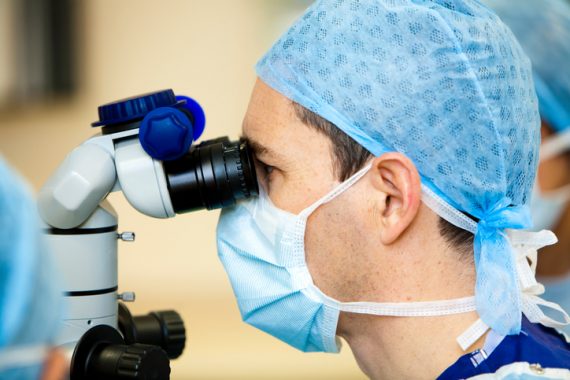How Do Cataracts Develop?
If you’ve asked yourself “how do cataracts develop”, know that the overwhelming majority of cataracts are age-related. If you are over age 55, you have most likely begun developing a cataract. Natural proteins in the eye begin to break down with age, clumping together to cloud the eye lens. In normal function, the lens focuses light on the retina, but the cataract can skew or even prevent this focus of light because the clumpy proteins cause the light to scatter.
Cataracts Are Gradual
 In general, cataracts develop very slowly. At first you will likely have no symptoms, but as the cataract grows in size, you may experience hazy, blurred vision. Colors may seem dull and less intense. You may have an increased sensitivity to daylight and trouble seeing at night. As your cataracts worsen, you will most likely experience more frequent changes in your vision correction prescription for eyeglasses or contact lenses, but vision changes can also be very gradual over a period of years.
In general, cataracts develop very slowly. At first you will likely have no symptoms, but as the cataract grows in size, you may experience hazy, blurred vision. Colors may seem dull and less intense. You may have an increased sensitivity to daylight and trouble seeing at night. As your cataracts worsen, you will most likely experience more frequent changes in your vision correction prescription for eyeglasses or contact lenses, but vision changes can also be very gradual over a period of years.
Unfortunately, surgery is the only real treatment for cataracts. No treatment strategies exist to slow down the progression or to prevent cataracts.
Who Is Prone to Cataracts?
The biggest risk factor for developing cataracts is age, but people with certain diseases like diabetes are more prone to developing them. Certain medications like corticosteroids or phenothiazine-type medications can also speed up cataract development. Lifestyle choices like high alcohol consumption or smoking can also accelerate development.
There are some things you can do to protect yourself from cataracts or slow the progression. First, wear sunglasses to reduce UV exposure to your eyes. If you are a smoker, quit. Nutrition is a key factor. Antioxidant intake is very important, so be sure to eat lots of leafy greens. You can also take nutritional eye supplements that contain important eye nutrients like vitamins E and C, zinc and lutein and zeaxanthin. Some research suggests that low levels of antioxidants like vitamins C and E are associated with cataract formation.
Getting a Diagnosis
If you suspect you have cataracts, come see our specialists at Elmquist Eye Group. We will do a thorough comprehensive patient history and eye exam to determine whether you have cataracts. We will perform visual acuity measurements to quantify how much your cataract is interfering with your vision, and also do refractive measurement to determine the vision correction prescription you need. We also might need to do additional tests to determine whether you have other eye diseases. Using all of this information, our Elmquist team will determine whether you are a good candidate for cataract surgery.
If your cataract is in the early stages, you may not yet need treatment. Instead, we will recommend regular eye exams so that we can monitor the progression. In some cases, we may be able to give you a new eyeglasses or contact prescription to temporarily improve your vision, but when the cataract begins to significantly impair your vision, surgery will be recommended.
Learn more about how cataracts develop and about the surgery that can significantly improve vision. Cataract surgery is done as an outpatient procedure and is one of the safest and most effective surgeries performed today. If you know or suspect you have cataracts, give Elmquist Eye Group a call today so that we can assess your condition.
